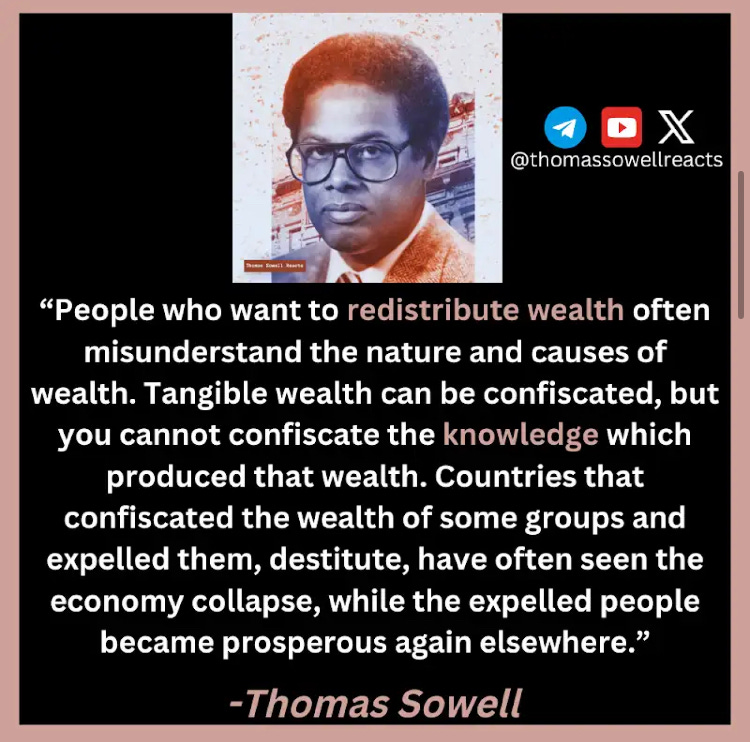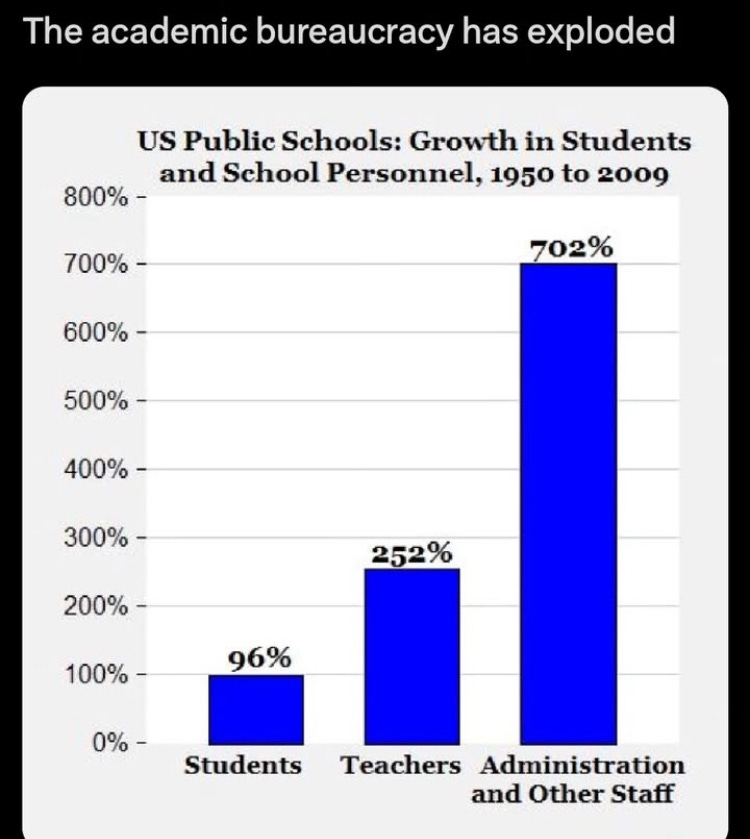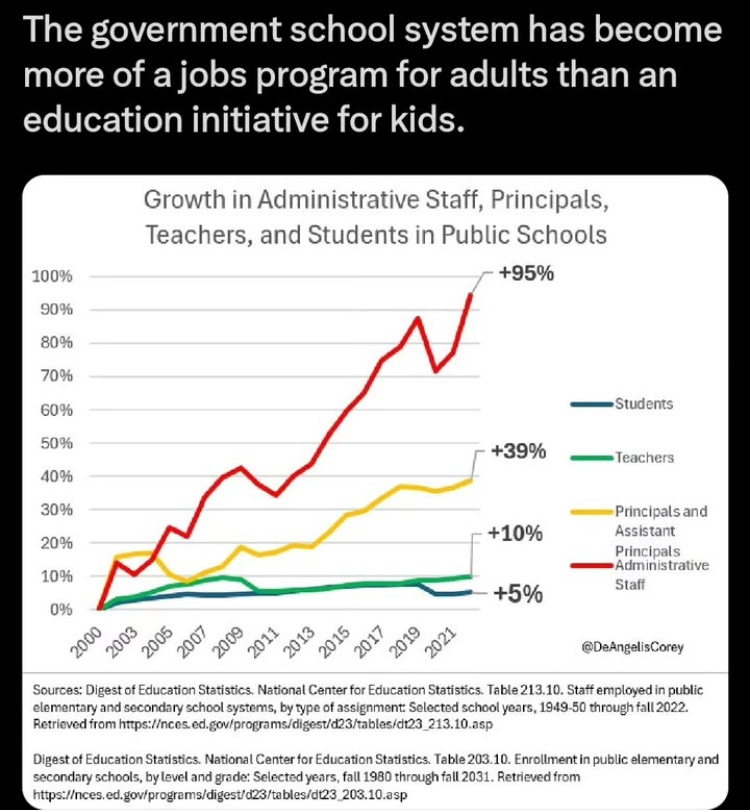A Clear Pattern
Bigger Government -> Poorer Society
I was researching for an article this week and I saw this figure: it costs $485,000 per inmate PER YEAR to run Riker’s Island, the shabby and dangerous East Coast Alcatraz sitting in the river between Queens and the Bronx.
Rikers is a New York City government-managed institution of course… but you’ll find a curious thing about large (anything bigger than a midsize town) governments, all over the world: wherever you look government tends to operate inefficiently. It now costs over $16,000 per student per annum to ‘educate’ an American public school student… a bigger sum than the cost of the vast majority of private schools. Let’s just say that quality has not kept up with the increases in cost. Our government is more than $36 trillion in debt, and calls to spend more are common.
Government tends to spend money with abandon. Unlike private sector organizations, which are incentivized to minimize costs and maximize quality, government departments usually try to spend every dollar budgeted to them-and constantly bid for more. When was the last time a government department (or a non-profit, or an NGO, which are now often de facto extensions of the government, in funding and operation) solved a problem and shut its doors, perhaps giving its members a bonus for a job well done? These organizations never disappear and (if they can help it) they never shrink. Either they’re terrible at solving social problems (which is pretty plausible) or they reflexively struggle to survive and expand, like an organism. Government tends to overspend on its employees and their pensions, and it tends to over-hire those employees. The tasks that require 5 people in the private sector will occupy 20 in the public, and each of those 20 employees will have mandatory breaks and essentially be unfire-able (in the normal course of things) and collect a generous 30-year pension… for 20-year careers. Government tends to gobble up money. The more money it gets the more it wastes.
Less talked about are the distortions and winner-picking of government, the tendency of corporations to capture regulatory bodies and use them as weapons against their smaller, nimbler, better competitors.
This is an awkward subject for the Left, for while the Left used to be intellectually promiscuous and full of ferment and diversity, they now contain essentially two impulses: (1) identity politics/social justice and (2) government spending on clients and nonprofits (especially them!) and corporate parasites and contractors.
Whether you’re looking at New York City or Argentina or South Africa or the federal government of the United States you will find all of these tendencies, and you will find that they’re dominant.
Politician with a chainsaw: Javier Milei, making statists nervous across the globe. Argentina’s economy is already beginning to heal and swell, after barely a year. If a government program had this result you’d hear about it dozens of times, even in a distant country like Argentina. The reality that trimming government spending and slashing regulation is usually beneficial for a country is not a welcome fact among those people whose wealth and status depend on their ability to tax and spend and regulate and administer.
Javier Milei, the Argentinean president, has been called the ‘Trump’ of his country but other than a vocal opposition to socialism he actually has very little in common with Trump. I suspect this common pejorative (for that it how it functions in the New York Times) has been deployed, nervously, as an epithet rather than an apt label, for Milei’s sole project is to drastically reduce the size of Argentina’s government.
Argentina used to be the 6th-richest country in the world and the wealthiest in South America. After decades of generous government transfer programs and subsidies and inflationary spending and defaults (8?) it found itself facing true economic disaster, with hyperinflation looming and the central bank’s credit ruined.
You can find example after example like this: Zimbabwe, Venezuela, California, Chicago-political units who overspent and became massive burdens upon their citizens, negatively affecting the economy. I can’t think of an example in which cutting government spending led to long-term impoverishment or crippled economic growth. When the state begins to drag the economy down the refrain on the Left is generally: spend more. One wonders if there’s a case in which cutting government spending would be advantageous in their minds.
It’s a curious thing about voters: they don’t seem to know very much about economics. The ideas that the government should spend money on the poor and pass laws to protect the environment and fund university education are popular, more or less everywhere. I think that if people could see that most of the poor’s money would be wasted (after being drawn out of productive businesses and factories and households) and that the environmental regulations would strangle investment and cause house prices to double and that the money for college would cause the costs of universities to balloon… I think they might feel differently.
Even after decades of misery and incompetence, Milei was only elected with 55% of the vote. That means that 45% of voters chose to continue supporting leaders and policies which had veritably ruined their country, that had failed badly and consistently for over 40 years. I’ve never been to Argentina but I can make a prediction: the politicians opposing Milei in 2023 fulminated against the rich and promised to distribute wealth more fairly. This is a story that people apparently never get tired of hearing.
If you look around the world for the past hundred years you can find many cases in which government expanded significantly, and equal numbers in which governments closed ministries and laid off employees and deregulated industries. In many cases a country took one measure (usually the first, chronologically-speaking) and then followed it up later with a move in the opposite policy direction.
I’m certain there are cases that I’m not aware of (I’m not an economist-I just read them) but in virtually every case that I’ve encountered an expansion of government causes a loss of national wealth and a gumming up of the labor market and the appearance of horrible distortions. Let me be clear: economics isn’t about charts and numbers and theories. That’s the lens through which it’s regarded, but economics is about the price of groceries and your prospect of getting a raise and the possibility of new apartments being built in your town and repairing the main bridge and stocking the pharmacy. It’s about roads and phones and vacations and homes. The very people who scoff at the prioritization of wages and growth and tend to favor things like ‘climate justice’ or equity or rent controls are usually the people benefitting handsomely (disproportionately) from economic activity. Conversely, every time a country has shaved a few points off its public GDP and deregulated economic sectors and liberalized state-owned companies, national wealth has grown and freedom has expanded.
Essentially, every building on this map costs NYC tens or hundreds of millions of dollars each year… for what is essentially a large county jail.
This is an experiment which has now been run (like the socialist experiment), on every continent and during every decade for the past century. We’ve tried managed industries and command economies and mixed economies and nationalized companies and regulated labor markets-they don’t work. There’s a reason that the trend across the world has been away from government control of the economy and toward free market principles. It’s not an absolute consensus, of course. Cuba, Zimbabwe, Eritrea, North Korea have remained on the ‘big government’ side of the ledger. China is close by… but their economic growth notably resulted from their opening up of their economy and allowing private investment to flow in and finance to flourish.
Sweden, Vietnam, Australia, Finland, England, Denmark, Taiwan, South Korea, Thailand, Botswana, Brazil. Chile, Georgia, Singapore, Poland, New Zealand, Japan, the UAE, India, etc. have all benefitted enormously from opening up their economies and reducing government control.
Mexico, Brazil, Italy, Egypt, Iran, Pakistan, Belarus, Ethiopia, etc. never really opened up their economies. Their elites were powerful enough or their political systems were rigid enough that government spending and control never really declined. Corruption remained foundational to national economic activity (as it generally is when the state runs things). The clients continued to get their payments and the lazy and inefficient remained protected from competition and openness.
South Africa (the only middle income with devastating, regular national electricity shortages which is not at war that I know of) has moved back in the ‘big government’ direction. Do you see the pattern I’m drawing? Trace the fortunes of Sweden or Britain or South Korea and watch their financial fortunes in the 20th century rise and fall, distinctly and negatively correlated with government size. The bigger the government, the poorer the people. Every market and nation and period is different of course. However, I know of no developed country that has NOT seen significant economic growth after liberalizing their economy… and I know of no country on Earth that has become wealthy through government control and exertion. Is that plain enough?
When I was younger people used to have debates about the proper size of government. I don’t think I hear these conversations as often anymore. Perhaps the elites have succeeded in dividing us on racial and ideological lines so that they can consolidate their control of the corporatist-statist blob. I hope not. Perhaps people are just focused on different issues. It was always a rather dry argument, but it’s an important one.
As we contemplate the incoming Trump administration and his incipient pledge to trim federal fat and dismiss homebound federal employees and cut spending, I think we can ALL acknowledge there’s a tremendous amount of government waste in the U.S. A smaller government would probably be good. I find the fact that very few people are contradicting these propositions openly an encouraging sign. Call Musk and Vivek ‘unhinged’ all you want-just don’t try to maintain that the Department of HHS is the proper sized or that it’s an efficient institution… or that public schools should get more funding. I’ve been hearing those arguments for 50 years now. Never once (as far as I know) have the promised benefits materialized. Instead, funding goes up-and then a few years later we’re told that funding will help the situation. It’s an endless cycle of argument made by people who treat national economies as endless sources of wealth.
I’ve noticed another pattern: when the media starts using excessive quantities of ad hominem language something good or useful might be getting ready to happen (just survey the tone of the articles about Milei if you doubt that). Equity and LGBTQ rights are one thing-can you imagine if the federal government was halved tomorrow and very little changed? Disaster!
But not for us.











Poverty in Argentina rose to over half the population on 2024.
Spot on. I'm catching up on your work and must say that there's got to be a place in the new presidential administration in the USA for you as a consultant or something in that capacity. Glad to meet you.
OD